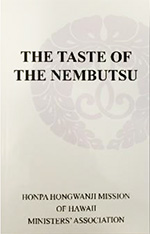
A message from Rev. Daido Baba which appears in the book, “The Taste of the Nembutsu,” published in 2016 by the HHMH State Ministers Association. The book is a collection of dharma messages by each of the active ministers.
To extend the reach of the dharma within these messages, we will publish one per week on our website.
Let’s Live a Life of Harmony
Rev. Daido Baba
In reflecting on what I experienced in Japan, I would like to share how I felt when some ministers were chanting a sutra. In Japan, ministers in the neighborhood help and chant together at other temple’s six major services. Those ministers chant a sutra together without having a joint practice session ahead of time. This is because every minister already knows how to chant. At a major service, I noticed one minister chanted at a quick pace and another one chanted slowly. It is beautiful if the chanting of a sutra is synchronized. However, their sutra was out of rhythm. The sound was not in unison. I thought both ministers might be thinking, “My tempo of chanting is right.” So the mismatch continued for a few minutes. I don’t think chanting should be like that. How should they resolve that? The answer is very simple. You should pay attention to hear the other voice in chanting. Then you can realize your tempo is mismatched. By knowing the other, you can know yourself.
In our Jodo Shinshu tradition, “to hear” is one of the most important things. By hearing, you can not only know the Jodo Shinshu teaching and Amida Buddha’s Vow but also know yourselves as I mentioned above. If you think your conviction is always absolutely right, you can’t accept other’s opinion. Jodo Shinshu teaches you that you are not absolute. By Buddha’s true light, our limitations are known. Then your view of other people changes, too. You don’t need to prove that you are right and they are wrong. Trying to understand the other person’s point of view can lead to a better understanding of your own view. Knowing oneself can lead to a better understanding of the other person. You can understand the difference between yourself and another person and accept it. All human beings are different. However, we are living together on this earth. You cannot live on your own. You are living in connection with others and are supported by everyone. In such a world, it is meaningful to understand others. Of course, it is more important to know about oneself. By living based on Buddhism, you can live with everybody in harmony.
In the Tannisho, the words of Shinran Shonin, compiled by a disciple Yui-en, Shinran expresses the view of himself as follows:
As for myself, Shinran, I don’t have a single disciple. If I could make others say the Nembutsu through my own devices, they would be my disciples. But how arrogant it is to claim as disciples those who live the Nembutsu through the sole working of Amida’s compassion.
This is a part of Chapter 6 of the Tannisho. It is a very famous quote. For us, Shinran Shonin is our great founder so we may think he had many disciples. However, Shinran stated “I don’t have a single disciple.” In actuality, Shinran had many disciples. In this sentence, Shinran didn’t mean to deny them. Shinran considered that every Nembutsu practicer was fundamentally Amida’s child and disciple who were nurtured by the Primal Vow to become a Nembutsu practitioner. So Shinran treated all those followers as co-learners of the Dharma and co-travelers of the Path to the Pure Land. If they were Shinran’s disciple, they may start to argue and fight over who got the true teaching from him. They may be attached to him and his teachings and would probably say my teaching was given to me by Shinran Shonin so it must be right. Shinran’s own son, Zenran, used his position in this way so Shinran disowned him. Shinran never acted arrogantly or positioned himself as a teacher. His thinking also expresses harmony. He strongly believed that everyone stands on the same level as himself in the heart and mind of Amida Buddha. When we realize how our deep attachments can be the cause of conflicts, disagreements, and distractions, we can reflect on our misunderstandings and live together in harmony.
The Teaching of Jodo Shinshu is not only a religion but also a way of life. To recite the Nembutsu, don’t only do it when you come to the temple. You can recite Nembutsu anywhere. You can reflect on yourself everywhere. We are living with lots of people and lots of problems. Please use the essence of Jodo Shinshu in dealing with this kind of reality, so you can spend the time in harmony. Let’s live a life of harmony with a smile and the Nembutsu in our hearts. This is the Jodo Shinshu life! Namo Amida Butsu.
